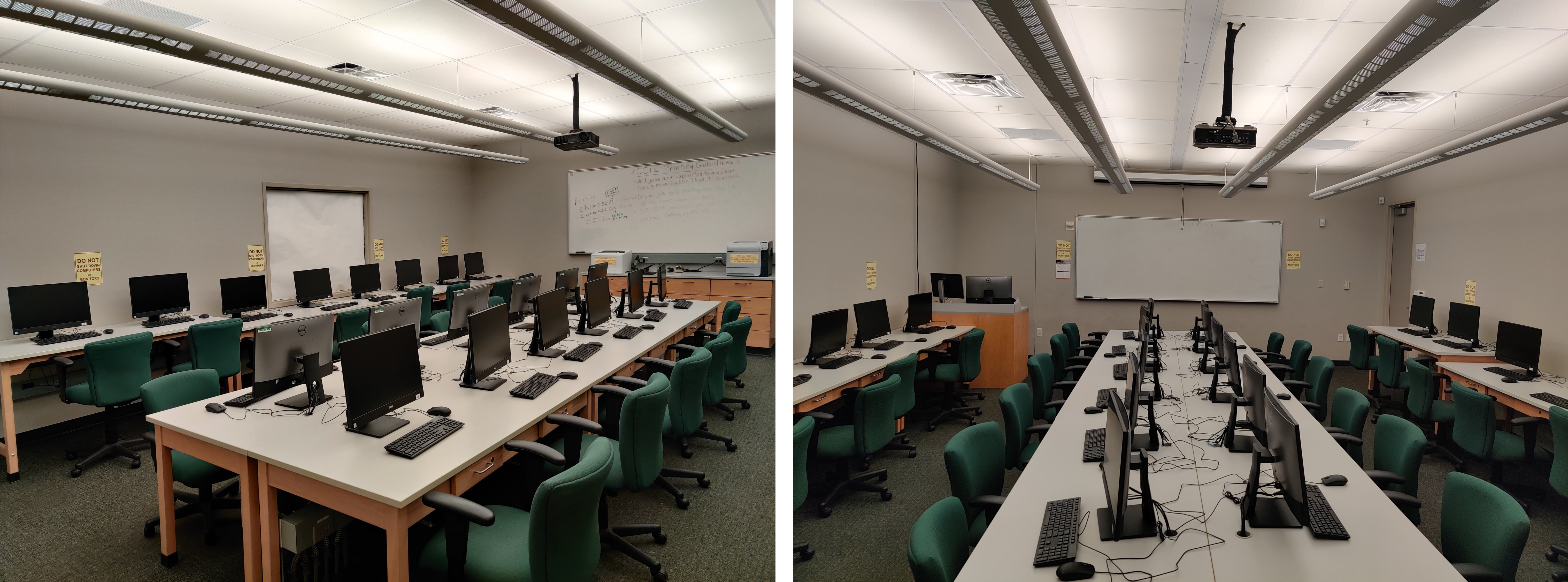Dr. Navneet Khetrapal
Research Scientist III
Office: Chemistry Building 321A
The Department of Chemistry provides computational facilities for both research and teaching. For research, there are high-performance computing facilities providing 160 nodes with a total of 4314 CPU cores, 100 GPUs, 34 TB of memory, and 1.73 PB of disk space. In addition to the extensive hardware there is a wide selection of computational chemistry software available for research, including Gaussian , ORCA , ADF , CFOUR , VASP , Quantum ESPRESSO , CASTEP , NWChem , Amber , LAMMPS , GROMACS , CP2K and TINKER. The teaching facilities include the Computational Chemistry Instructional Lab (CCIL). CCIL provides resources for both undergraduate and graduate education.
Cruntch3: A 100 node Dell cluster with a 10-gigabit interconnect. The master node is a PowerEdge R630 with two 10-core Intel Xeon E5-2640 v4 processors, 128 GB memory, and two 300 GB SAS disks (RAID1). The login node is a PowerEdge R630 with two 10-core Intel Xeon E5-2640 v4 processors, 128 GB memory, two 300 GB SAS disks (RAID1), and eight 2 TB SAS disks. There are 48 PowerEdge C6320 compute nodes each equipped with two 10-core Intel Xeon E5-2640 v4 processors, 192 GB memory, and one 1.2 TB SAS disk. There are 32 PowerEdge C6300 compute nodes each equipped with two 10-core Intel Xeon E5-2660 v3 processors, 128 GB memory, and one 860 GB SAS disk. There are 4 PowerEdge R930 compute nodes each equipped with four 18-core Intel Xeon E7-8867 v4 processors, 1152 GB memory, and one 1.2 TB SAS disk. There are 8 PowerEdge R730 compute nodes each equipped with two 10-core Intel Xeon E5-2640 v4 processors, 128 GB memory, one 1.2 TB SAS disk and 4 Nvidia Tesla K80 GPUs. There are 4 PowerEdge C4130 compute nodes each equipped with two 10-core Intel Xeon E5-2660 v3 processors, 128 GB memory, one 680 GB SAS disk and 4 Nvidia Tesla K80 GPUs. There is 1 PowerEdge C4130 compute node equipped with two 10-core Intel Xeon E5-2640 v4 processors, 192 GB memory, one 680 GB SAS disk and 2 Nvidia Tesla K80 GPUs. Additionally, there are two network attached storage devices: 8.6 TB storage connected via 10-gigabit ethernet and 145 TB storage connected via InfiniBand network.
Cruntch4: A 60 node Dell cluster with a gigabit interconnect. There are 2 PowerEdge R650 master nodes in high-availability set up, each equipped with two 12-core Intel Gold 5317 processors, 384 GB memory, and two 446 GB NVMe disks (RAID1). There are 40 PowerEdge R650 compute nodes each equipped with two 18-core Intel Gold 6354 processors, 192 GB memory, two 240 GB NVMe disks (RAID1) and two 1.92 TB SAS disks (RAID0). There are 3 PowerEdge R650 compute nodes each equipped with two 32-core Intel Gold 6338 processors, 192 GB memory, two 240 GB NVMe disks (RAID1) and two 1.92 TB SAS disks (RAID0). There are 12 PowerEdge R750XA compute nodes each equipped with two 16-core Intel Gold 6326 processors, 192 GB memory, two 240 GB NVMe disks (RAID1), two 1.92 TB SAS disks (RAID0) and 4 Nvidia Ampere A100 GPUs. There is 1 PowerEdge R750XA compute node equipped with two 16-core Intel Gold 6326 processors, 192 GB memory, two 240 GB NVMe disks (RAID1), two 1.92 TB SAS disks (RAID0) and 2 Nvidia Ampere A100 GPUs. Additionally, there is 535 TB of direct attached storage and, 802 TB of network attached storage connected via InfiniBand network.
FY25 Cruntch HPC rates
|
Category |
CPU core hour |
GPU hour |
Hosting fee per watt |
|
UNT users |
$0.002351 |
$0.040487 |
$0.257095 |
|
External academic users |
$0.015018 |
$0.258660 |
$1.642520 |
|
External commercial users |
$0.017700 |
$0.304850 |
$1.935827 |
Computational Chemistry Instructional Laboratory (CCIL)

CCIL contains 28 All-In-One Dell OptiPlex 7460 PCs each equipped with an Intel i7-8700 processor [3.2 GHz], 8 GB of memory, and a 250 GB SSD disk drive. A similarly equipped instructor's station is available with a projector for displaying the instructor's monitor to the class. Two printers (one color, one black and white) are available for printing chemistry related materials. Software for the Windows 10 operating system are available (e.g. MS Office, Adobe Acrobat, Google Chrome, etc…). In addition, the following chemistry- and science-related software are available: ChemOffice, Discovery Studio, Gaussian16W, UCSF Chimera, SpinWorks, Mathematica, MATLAB, SigmaPlot, IBM SPSS Statistics, and molecular visualization software (i.e. Avogadro, GaussView6.0, and VMD). The lab is open to all undergraduate and graduate students enrolled in chemistry courses, and a laboratory teaching assistant is available to assist users during scheduled hours.